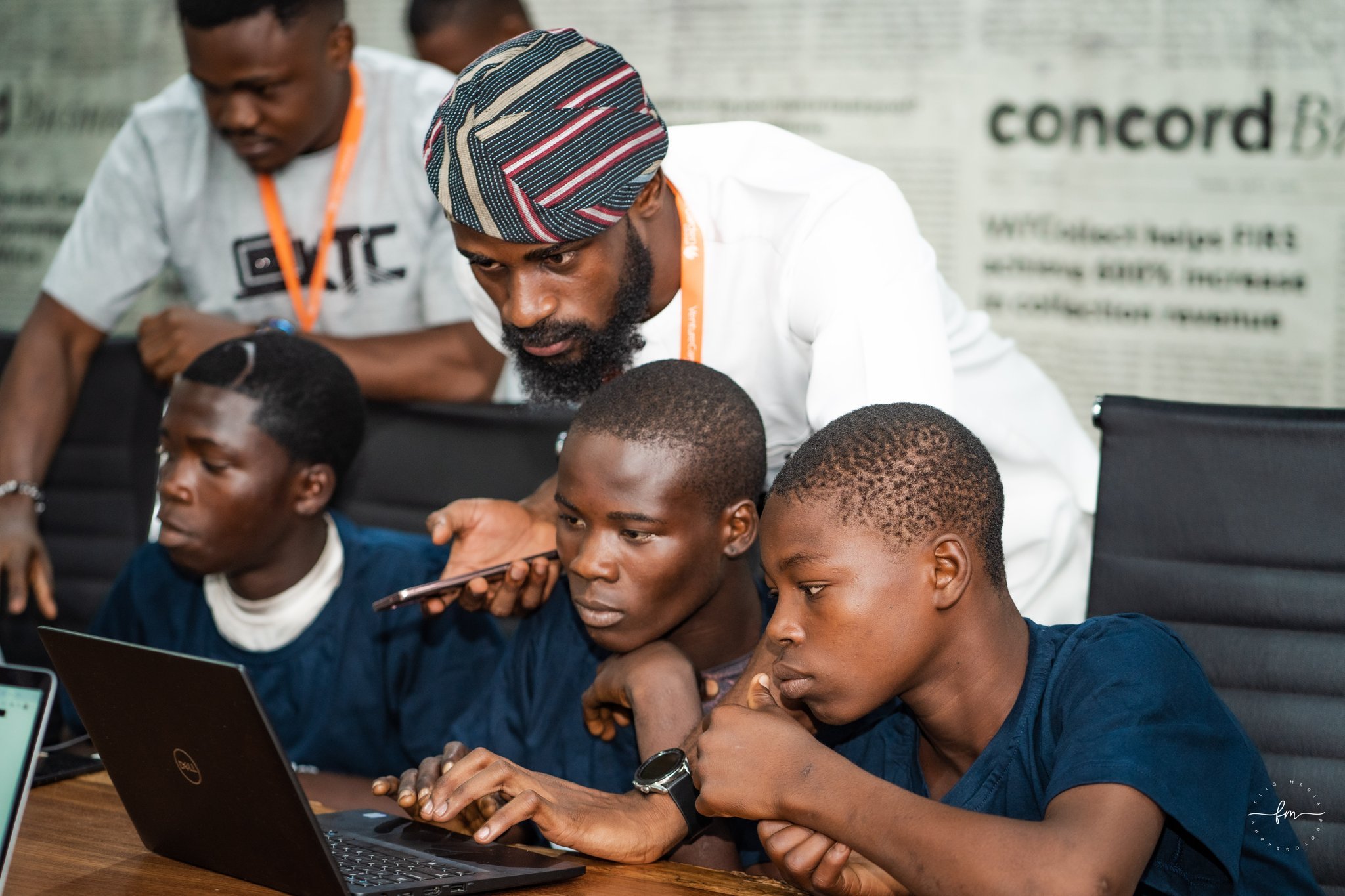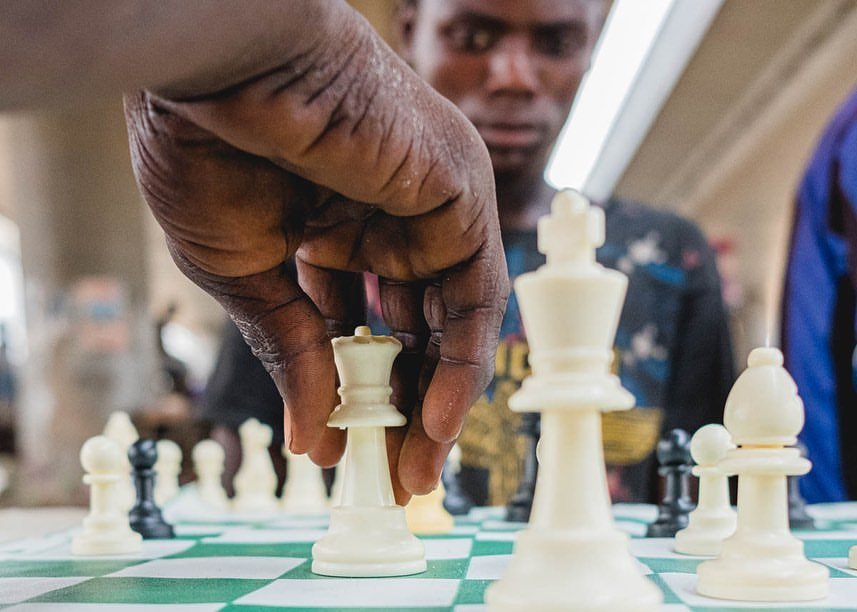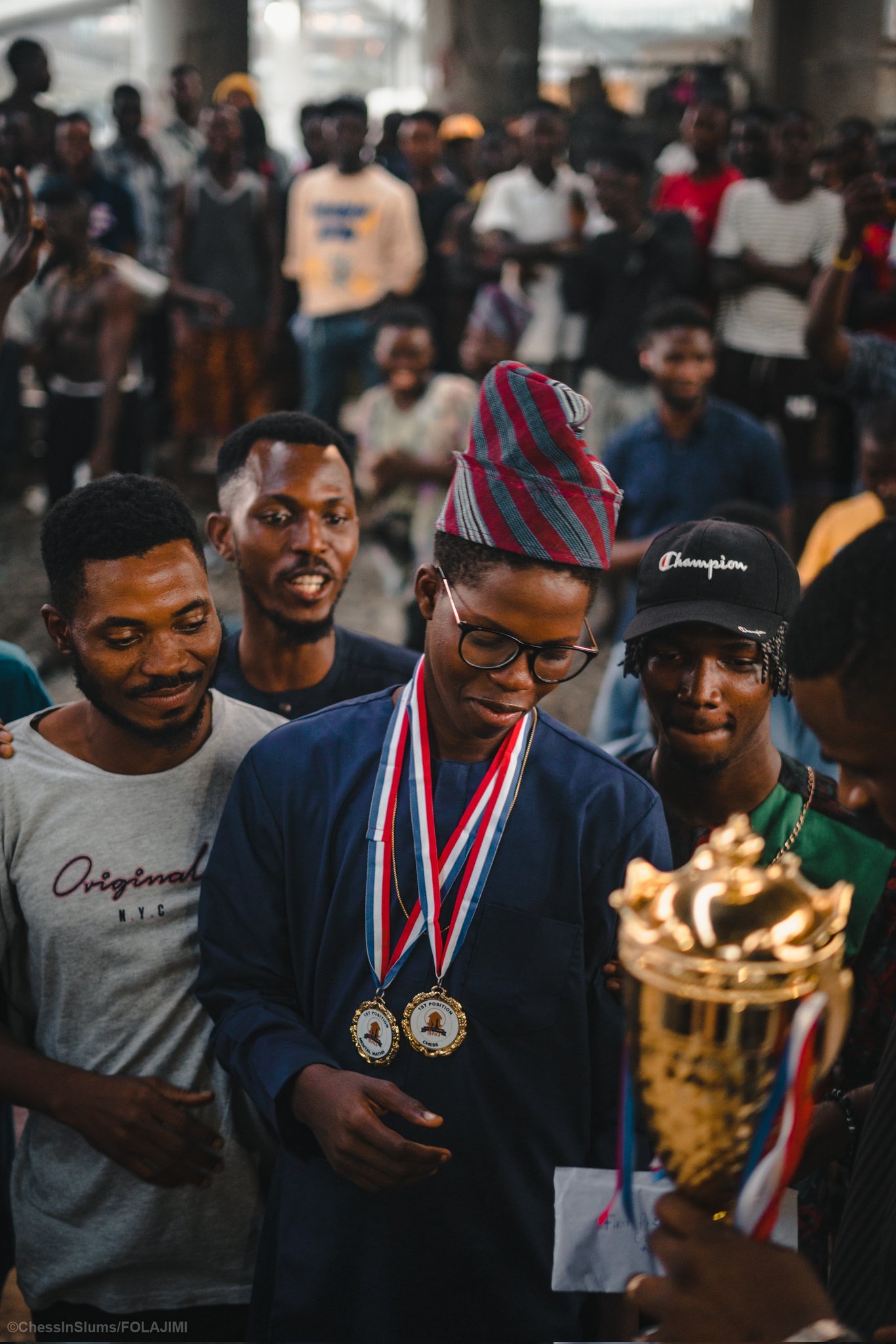One of the most amazing things about the game of chess is in the innate ability of the pawn, which is the least valuable piece, to become a queen — the most powerful piece on the chessboard.
This analogy deeply reflects the true essence of what Chess In Slums Africa is doing: every child, irrespective of their background, has the capacity to become powerful and successful through education.
“Anytime we start [working] with a child, we see them as pawns on a chessboard. But then, that is not all that there is to them; they have power to become much more valuable, the only difference is access. So we give them that access, we give them information, we give them education, so they can create the future that they want for themselves and become the queen, the most powerful piece on the board,” says Tunde Onakoya, founder of Chess In Slums Africa.
Given the fact that Africa is home to the largest number of out-of-school children in the world, this mission has the potential to have a profound effect on the future of the continent’s 43 million out-of-school children.
This was the vision Onakoya had in 2015 when, as a young graduate, he decided he wanted to dedicate his life to one thing: teach the game of chess to children as a means to access quality education.
After he visited the Majidun (a community in Lagos, Nigeria) and saw lots of children living in very poor conditions and unable to access quality education, his dreams moved beyond just teaching them how to play chess to using the game as a tool to educate them and empower them to dream big.
After multiple successful attempts to teach kids the game of chess that saw the number of children interested in the game climb from 10 to 100 in the Majidun community, Onakoya knew there was no turning back: he had found his path.
On Sept. 1, 2018, Chess In Slums Africa was officially launched.
“From the onset, I already knew that this was what I wanted to do for the rest of my life. I knew it was only going to be a matter of time — whether it was going to be 10 years, 15, or 20 years, I didn't know when, but I knew it was going to happen eventually,” Onakoya told Global Citizen and Bella Naija.
Today, Onakoya and the Chess In Slums Africa team have gone beyond Majidun into Makoko (a floating slum in Lagos), Oshodi, and even Burkina Faso. They have also trained more than 500 children so far, taking them from zero knowledge of chess to the intermediate level, and sponsored 100 children to go to school through academic scholarship support.

Teaching Chess in Slums
Chess In Slums is a nonprofit organisation that uses the game of chess as a framework to give education to children in impoverished and underserved communities. But with more than 10 million out-of-school children in Nigeria who need urgent and optimal attention, how does Chess In Slums Africa decide who gets more attention and when?
"We have our target demographic: children in slum communities. But at the same time, we can't do it for everyone. So whenever we go to a new community, we set out the number that we want to work with,” says Onakoya. “For Oshodi, we set out to [work with] 20 children. We ended up teaching 51 kids. We go to the community and we profile the children, then do a vulnerability assessment to know the children that are the most vulnerable: those that are orphans; the ones that have spent the longest time on the streets; and the girls — because they are the most vulnerable especially in [those communities we work in].”
Onakoya also said that while there are a lot of children in poverty in Nigeria and across Africa, there are some that have it worse. “99% of the kids in Oshodi don't have a home — they sleep under the bridge. There are some kids that have parents, but ran away from home [due to various reasons], while there are others that are orphans who don't have any family."
He added: “The ones [who] are most vulnerable and have the most struggles are the ones we prioritise. We [identify] children we want to work with between the ages of six and 20 and create profiles of them: their name, age, aspiration, dream, talents, everything we can find out about them. It helps us to understand how best to support their dreams."
Naturally, helping a vulnerable child is only one step — continuity and sustainability is key, according to Onakoya.
“You need to be able to listen to them to understand their particular struggles from a very intimate point of view. We treat every child distinctively, so we have that personal connection with each one of them before adding them to our programme. For us, chess is the focal point; it is an educational tool," Onakoya said. "Our programmes are divided into three phases: the beginner phase, intermediate, and master. As they progress from zero knowledge of the game through the levels, we have a monitoring and evaluation system and we use the chess-kid curriculum, which is the best curriculum in the world for children to learn chess and compete."

The Impact Chess In Slums Africa Has Made So Far
For Onakoya and his team, chess isn't just a game and its impact is beyond making a pawn a queen — it is redefining education beyond the four walls of the classroom.
"When you see a child sitting down for one hour to play chess, it's not just about chess, it's about what it teaches: patience, focus, high-level concentration, critical thinking. So they're learning all those disciplines through chess," Onakoya says, "Chess in itself is a fun game that will open them up to a lot of opportunities, but it's also an educational resource. For me, education is more like the capacity for thought, for the children to be able to think independently. That is why we are teaching them chess as a way for them to be educated in a different way, to learn how to think for themselves, not teach them what to think but how to think for themselves and come up with solutions for problems.”
“I believe education shouldn't just be limited to the four walls of the classroom, especially for the target demography of the children we work with," he adds. "We work with children on the street in ghetto areas and these children who do not have access to education because our conventional educational system is not designed to capture children like that, which makes chess a great alternative to engage their minds."
So far the Chess in Slums Africa team has reached four communities, carried out more than 36,000 hours of chess training with $400,000 in academic scholarships given out so far. Furthermore, the organisation has given out 200 scholarships to more than 1,000 children.
"So far, we've impacted four communities: Majidun, in Ikorodu, then we went to Makoko," Onakoya says. "From Makoko, we went to Kaya, an orphanage in Burkina Faso where we partnered with the home to set up a chess academy for them and we were able to train about 50 children. Our vision is to reach a million children within the next five to 10 years."
Nigeria and Africa’s educational challenges highlight the difficulty in providing quality and sufficient education that is inclusive of very varied intellectual capabilities, financial and social status, which has proven to be a herculean task for governments across the continent. Chess In Slums Africa is helping bridge this gap, and now, over 86% of children enrolled in the organisation’s programmes remain in school, according to Onakoya.
"We put the children in our academy who cannot afford education in school," he says. "We sponsor their education, and take record of their academic performance in school. Another problem is that children go to school but don't stay in school because they don't see the value of learning and then when it becomes difficult they leave."
"But children in our academy now understand the value of learning, so more of them stay in school,” he continues. “We have that system that also monitors their progress in school, and in our own programme too — how they run through the levels, and how they progress over time. Because we have tests to evaluate their tournament participation and progress based on our curriculum, a lot of children have won tournaments, scholarship opportunities, and more.”

Over the last few months, Chess In Slums Africa has partnered with several organisations such as ChessKid, Chessable, Chess.com, Lufthansa, Lazerpay, MedPlus, and, more recently, a partnership with KidsthatcodeNG will also help the children learn software skills. They also launched the the Chess Fìlà (Yoruba word for cap) as part of their global fundraising campaign to raise money to build a chess academy.
Recently, Onakoya also won The Future Awards Africa prize for community action.
Powering Through a Pandemic
In today’s world, people living in underserved communities are often overlooked. Organisations like Chess In Slums Africa do more than rescue kids — they also rekindle hope in these children. Because of Chess In Slums Africa’s work, there are now new conversations about places like Oshodi and Makoko that have been written off for years.
But like every founder, Onakoya’s journey has been fraught with bumps and hurdles, especially when COVID-19 hit.
“The COVID-19 era was particularly difficult because we couldn't even train the children anymore — things were bad for everybody, and we couldn't even sustain the programme," he says. "I lost my teaching job because schools were closed. There was just no way to make income and it was tough. We started thinking about going virtual and started writing emails to people."
"People donated iPads for the children, and we also received lots of support from the international chess community," he continues. "That was when we got the partnership with Chesskids, so we didn't have to always be with the children anymore; we could now get them iPads and they could now play and continue training and competing virtually.”
According to Onakoya, most of the parents of the children his team worked with lost their trades, and were often calling Chess in Slums Africa for financial aid. Onakoya and his team knew the impact would trickle down to the children, so they organised a fundraiser called "Checkmating COVID-19" to raise money to buy food items for the families of the children they work with.
Chess Beyond Borders
Chess In Slums Africa is slowly but steadily spreading beyond the borders of Nigeria too.
"The trip to Burkina Faso was one we did because we wanted to see what was possible beyond Nigeria," Onakoya says. "We wanted to go to Africa because this dream is not just for Nigeria, it's for Africa. So we wanted to go and see what was possible; could we replicate the same model in other countries in Africa? People in Burkina Faso don't speak English, they speak French, but we were still able to run our programmes for them and successfully set up a chess learning centre, so yes, it was possible."
Beyond Africa, Chess In Slums Africa is receiving wide acclamation: people are reacting positively to the work done so far with mentions from celebrities like Paris Hilton, which encourage more people to donate to the organisation and initiate partnerships that open up opportunities for more children.
"The short-term goals for us right now is to raise more money," Onakoya says. "We want to raise a million dollars, go to more African countries, reach 5,000 children and sponsor 1,000 children to school on scholarship support this year. We also want to go to 10 more communities this year."
He adds: “Long-term, we want to build the chess academy. The Oshodi project taught us something very important: that there are children who have it worse. We’ve been going to the communities with children that actually had parents, or at least have a home, even if it’s dilapidated."
"But there are children in Oshodi and so many other slums who have no parents or roofs over their heads," he says. "There needs to be a safe space for them to learn. A place you call home. That’s why we want to build an academy and we want to make it the biggest chess academy in the world. It will have a home facility, an accommodation facility for the children, street children, and orphans to stay. It will be a chess academy, but it won't just be chess, we want to reimagine education in a different way."